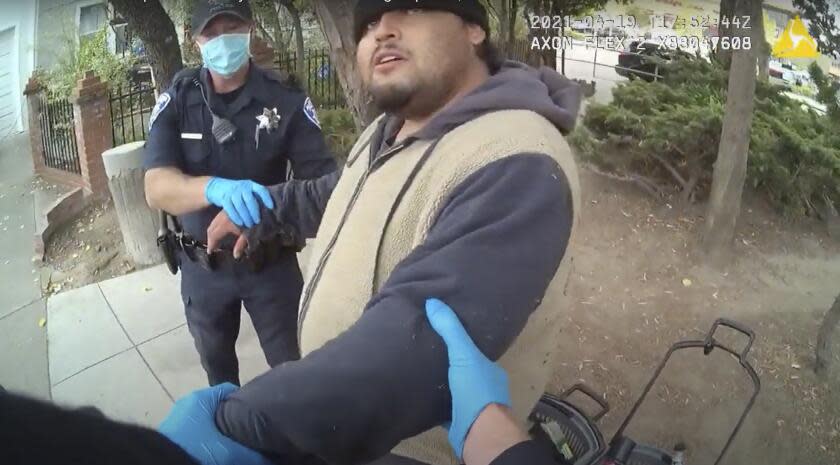3 Alameda police officers charged with involuntary manslaughter in 2021 death of Mario Gonzalez

- Oops!Something went wrong.Please try again later.
Nearly three years after a Bay Area man died when police pinned him facedown, in a case that drew comparisons to the killing of George Floyd, the Alameda Police Department officers involved have been charged with involuntary manslaughter, authorities announced.
The charges in the death of Mario Gonzalez, 26, came Thursday. Gonzalez died after an altercation with police on April 19, 2021. No charges were filed against the officers at the time.
An initial autopsy cited "physiological stress of altercation and restraint" as one of four factors in Gonzalez's death, along with the "toxic effects of methamphetamine,” morbid obesity and alcoholism.
The Alameda County district attorney's Public Accountability Unit reopened the case in 2023, and a second autopsy determined that Gonzalez had died as "a result of restraint asphyxiation," according to the prosecutor.
The case was brought by Dist. Atty Pamela Price. Elected in 2022, Price had promised in her campaign to reopen the inquiry, which had been closed without charges by previous Dist. Atty. Nancy O'Malley.
The three officers, Eric McKinley, James Fisher and Cameron Leahy, were charged with involuntary manslaughter.
Read more: Outrage grows as new video shows Latino man dying after Bay Area police pin him for 4 minutes
Gonzalez's death drew comparisons to Floyd's 2020 murder in Minneapolis by then-Officer Derek Chauvin, a killing that set off nationwide protests against police brutality.
Less than a year later, police officers in Alameda responded to a report of an intoxicated person and possible theft at a local park.
Body camera footage released by the Police Department shows the officers' interaction with Gonzalez. In the video, Gonzalez struggles to answer their questions and appears dazed. After he fails to produce identification for the officers, they attempt to pin his hands behind his back to handcuff him.
The officers determine that Gonzalez is resisting and push him to the ground, the video shows.
"We’re going to take care of you, OK? We’re going to take care of you,” one officer tells Gonzalez as they continue to restrain him.
“I think you just had too much to drink today, OK? That’s all,” the officer continues. After learning his name, the officer adds, “Mario, just please stop fighting us.”
Gonzalez can be seen facedown in wood chips, grunting and shouting as the officers hold him down.
One officer puts a knee on Gonzalez's back and holds it there for at least four minutes, even as Gonzalez gasps for air.
“I didn’t do nothing, OK?” Gonzalez says at one point.
An officer eventually says that Gonzelez is "going unresponsive," according to the video. The officers then roll Gonzalez over and perform CPR on him. He died at the hospital later that day.
In its initial public comment on the case, the Alameda Police Department did not mention that Gonzalez had been restrained, saying only that "officers attempted to detain the man, and a physical altercation ensued. At that time, the man had a medical emergency."
But Gonzalez's family saw the situation differently.
“The police killed my brother, in the same manner they killed George Floyd,” his brother Gerardo Gonzalez told reporters at the time.
Alison Berry Wilkinson, a lawyer who represented all three officers during the criminal investigation but who now represents only Leahy, called the case a "blatantly political prosecution."
"The officers’ actions while taking Mr. Gonzalez into custody were reasonable, necessary, and lawful, and his tragic death was the result of drug toxicity, not criminal misconduct," she said.
All three officers are still active in law enforcement and will surrender themselves in the case, Berry Wilkinson said.
This story originally appeared in Los Angeles Times.

